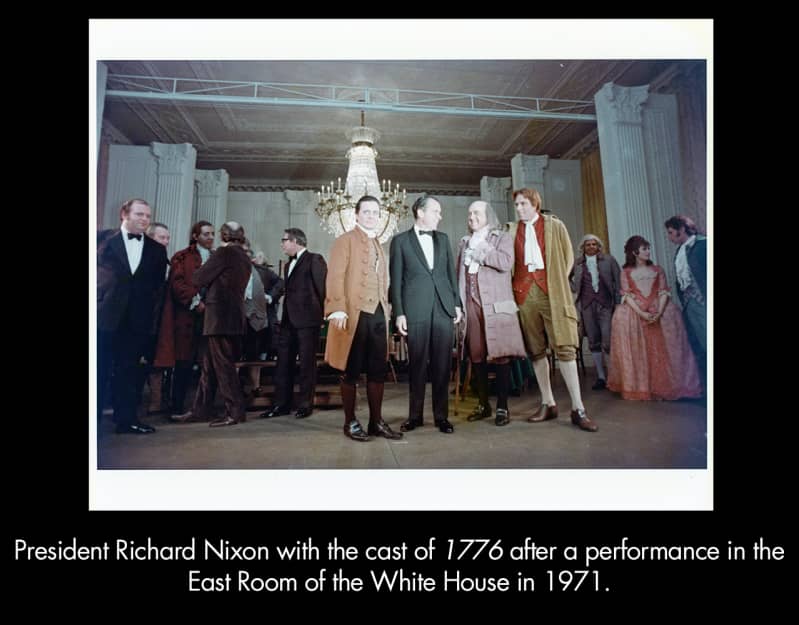Edwards and Stone’s hit musical, 1776, premiered on Broadway in 1969. A dramatization of the signing of the Declaration of Independence, 1776 has its roots in historical truths, as well as in the political climate of the Vietnam-era and the “summer of love.”
Jump to:
Ultimately well-received by critics and audiences alike, 1776 gestated with composer and lyricist Sherman Edwards for years before its 1969 premiere. Edwards was born in 1919. He studied at NYU and Cornell, served in the Air Force during WWII, and later found himself teaching history in public school. A true renaissance man, Edwards was a seasoned jazz pianist who performed with Louis Armstrong, wrote pop and rock songs at the renowned Brill building in New York City for artists including Elvis Presley, and performed as an actor in several Broadway plays.
At 40, Edwards left his day job to pursue writing 1776 full time. The songs came first and most fluidly. Initially, it was difficult for Edwards to find collaborators who believed in the necessity of telling this story. He used his music to pitch the idea to book writers, but at the first go, no one was interested in working on this historical musical. Undeterred, Edwards wrote the original libretto himself, largely based on historical research from his personal archive, Pennsylvania Historical Societies’ libraries, and the Manuscripts, Archives and Rare Book Division of the New York Public Library. It took Edwards five years to research and generate the book and lyrics he would later use to pitch 1776 to producers.
Edwards eventually connected with the legendary Stuart Ostrow, a seasoned Broadway producer who saw the promise in Edwards’s idea. In the late ’60s , the women’s movement, the civil rights movement, and the anti-war movement all coalesced to create an intense political climate. People were protesting, and loudly. Many producers passed on 1776, not seeing why a show about white men in powdered wigs would be appealing content in the day’s political climate. Ostrow saw past the superficial optics, and realized that the rebellious spirit, the challenging of status quo, and the questioning of authority intrinsic to the story of 1776 would make it a musical of the moment and potentially a hit. Ostrow set out to find a seasoned playwright to polish the book for Broadway. Enter Peter Stone.
Peter Stone had already made a name for himself writing for film, with his breakout hit Charade (1963) starring Cary Grant and Audrey Hepburn. He became a contracted studio screenwriter, and his subsequent scripts include Mirage, Arabesque, Jigsaw, and Father Goose, for which he won the 1965 Academy Award® for Best Original Screenplay. Stone had previously been approached by Edwards to collaborate on 1776’s libretto but had passed on the offer. A few years later, Ostrow approached Stone with the project once more. Stone finally saw the spark in Edwards’ songs, the inspiring spirit of the story, and ultimately recognized the prescience of the piece. He accepted the task of writing the libretto for 1776, which would become his first Tony Award®-winning musical. Stone later became the first writer to win an Emmy, an Oscar, and a Tony. Over the course of his life, he wrote over a dozen musicals and two dozen screenplays. A lauded librettist and screenwriter, he served as president of the Dramatists Guild of America for 18 years.
Edwards, Ostrow, and Stone’s vision coalesced into 1776’s premiere on March 16, 1969 at Broadway’s 46th Street Theatre. The piece received rave reviews. Clive Barnes of The New York Times deemed it “a most striking, most gripping musical.” The review in The New York Post remarked that “[i]n this cynical age, it requires courage as well as enterprise to do a musical play that simply deals with the events leading up to the signing of the Declaration of Independence. And 1776... makes no attempt to be satirical or wander off into modern bypaths.” It won the New York Drama Critics Circle award for Best Musical, and the Tony Award® for Best Music and Lyrics, solidifying its place in the American musical canon. The play toured the country twice that year, and soon became a staple in community and regional theatres. The show closed three years later, on February 13, 1972, after 1,217 performances.
References
|
“1969: An Eventful Summer.” CNN, Cable News Network, 2009. Diana, Bertolini. “Here's to Peter Stone! Screenwriter, Book Writer, and... Speechwriter?” The New York Public Library, 7 July 2011. Edwards, Sherman, and Peter Stone. “Historical Note by the Authors of 1776.” A.R.T., 15 May 2022. “1776.” Internet Broadway Database, The Broadway League, 2022. Itzkoff, Dave. “Stage Revolutions, Four Decades Apart.” The New York Times, 30 Mar. 2016. Kare, Jeffrey. “The Making of America's Musical- 1776: The Story behind the Story.” BroadwayWorld.com, 4 July 2016. “Sherman Edwards.” PenguinRandomhouse.com, Penguin Random House Network, 2022. Yates, Steve. “About the Playwright: 1776.” Utah Shakespeare Festival, n.d. |



